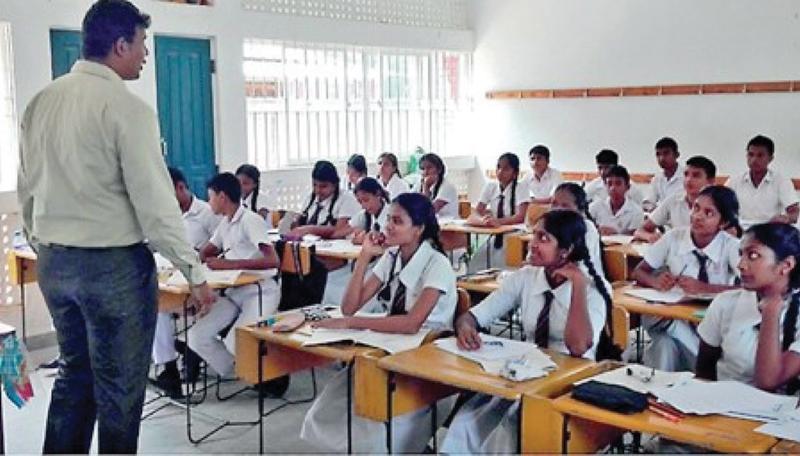
Continued from October 18
There should be no homework set in any subject for the weekend.
Students will have time to play, to climb a tree, to go on trips with their parents, to devote some time for their extra-curricular activities and attend DahamPaasala during the weekends. The foregoing is for Grades 6-11 only.
There should be homework set for the weekend for the ‘A’ Level students. If schools adhere to the homework timetable, the students in Grades 6-11 will be able to leave half of their textbooks in their lockers every day because homework has been set only in a couple of subjects per day. The weight of the schoolbag will be reduced by 50 percent. They will be able to keep their sport shoes, swimming trunk, capand umbrella also in their lockers.
6 The problem of private tuition classes:
Many teachers do not teach the course or the finer points of the course in the classroom. They teach it in their private tuition classes in the evenings and during the weekends. This is morally wrong because those teachers get their full-time salary from the school and finally a pension also. Parents keep doling out thousands of Rupees per month to private tutors. The student does not have time to play or to enjoy their childhood years. When exams approach, it becomes a rat race.
There is a case for increasing the salaries of teachers. The Government should look into it, but there is a limit to what the Government can do about raising salaries.
In countries, such as Switzerland, Germany, Australia and Kenya, teachers get high salaries. There is very little private tuition in those countries because teachers are happy and take their job seriously. In Switzerland, a secondary school teacher who is academically and professionally qualified and has 5 years of teaching experience gets the same salary as a university lecturer or a staff officer in a Swiss Bank. The Ministry of Education in Switzerland is aware of the fact that teaching and lecturing are two different things.
Many years ago a school in Pakistan solved the problem of private tuition classes.
The school, the parents and the teachers who conduct private tuition classes entered into a contract: Parents contributed 50 percent of the money that they normally spend on private tuition per month to a special fund.
The monies in the fund were used to give salary increments to teachers. In return, the tuition masters promised to do a good job of teaching in class and to stop their private tuition classes. There were a few exceptions: eg. There will always be a few weak students who need private tuition.
The teachers who conduct private tuition classes should consider the following:
(i) After doing a full-time job at school, you spend many hours during the week giving private tuition. You earn money, but at what cost to your health? You have been on the ball from 8 a.m. to 9 p.m. and after you are stressed.
You have no energy left to devote to other things. Do you realise the extent of the damage that you are causing to yourself and to your family? One famous educationalist (Leo Feming of UNESCO, Paris)once remarked: “If you want to shorten your life span by seven years, give private tuition”.
(ii) Look carefully at the families of teachers who do not teach in class but perform a good job of teaching in their private tuition classes and then look at the families of hardworking teachers who do an honest job of teaching in class. The former group has health and other problems in their families, their children have problems and they never do well in life. The latter group has no problems in their families, their children study well and become doctors, engineers, accountants and staff officers.
7. Technical (Vocational) Education:
A recent newspaper article on Technical and Vocational Education and Training (TVET) stated that the result of providing a trained and fully job prepared skilled worker to the market is not yet in place. The inadequacies of the TVET system and some of their problems are due to the shortage of suitable instructors, obsolete training equipment and machinery and lack of practical input to develop the curriculum.
Sri Lanka needs more Technical Schools to train secondary school leavers. We may need foreign experts to revamp the curriculum, to install modern equipment and machinery and to run our TVET schools.
We need the help of Germany, Switzerland, UK and Canada to set up technical training schools and to procure competent foreign personnel to train instructors and students. The important thing is to make a start NOW. This should be an important element in the country’s plan for economic development.
In Melbourne, Australia, you will find over 500 Sri Lankans working in factories in and around the state of Victoria. All of them are graduates of the German Sri Lanka Technical Institute, Galle Road, Ratmalana.
They did not have the GCE (O/L) qualifications, but they received a good technical training at Ratmalana. The Government of Australia welcomed them and their families as immigrants.
They were provided with air tickets, courses in spoken and written English, a house, a car and a decent salary.
In contrast, the majority of Sri Lankan B.A. and B.Sc. graduate teachers are not eligible to enter Australia as immigrants because they do not have professional qualifications.
